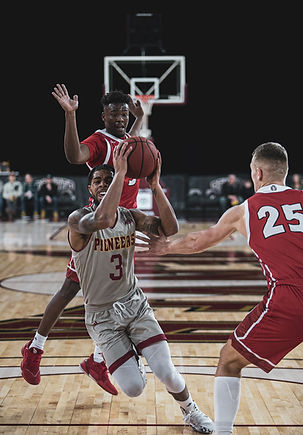BASKETBALL STRENGTH & CONDITIONING
Whether you're a high schooler playing for a basketball scholarship, a college player prepping for tryouts, or a pro eyeing All-star status, IHP is your training hub. Running drills on countless free-throws won’t make you bigger, faster, or stronger—but IHP basketball training will. Hours of flexibility drills won’t enhance mobility or prevent muscle pulls—but IHP basketball training will. Learning Olympic weightlifting or doing plyometrics won’t boost basketball explosiveness—but IHP basketball training will. If that ignited your interest, read on and click the tab below.


Basketball - A team sport made of individual skills:
Basketball is a game that requires different attributes and skills. With 5 positions and 5 players on the court at any one time, each player requires specific abilities. During training, teams often group players by position for time efficiency, but it's not always the optimal approach. Every position requires the development of unique skills. Addressing individual strengths and weaknesses is challenging in team settings; this is where IHP's one-on-one basketball training excels.
Position, Position, Position:
There's nothing more critical than POSITION. And by position, we're not just talking about your designated spot on the court. It's about being in the right place at the right time during gameplay. When you're positioned correctly, you can execute crucial moves like maneuvering around a screen, blocking a shot, stealing a pass, or cutting to the basket. A single bad call, bad read, or delayed action can cost you a game-winning position you can’t recover from. While everyone aims to diminish the significance of positioning, physics ensures its undeniable importance. So, the question remains: How do you enhance your positioning?
The Great Basketball Training Myth:
Over the past 23 years, we've had basketball athletes and their parents seeking a variety of physical characteristics and abilities they believed would boost basketball performance. Whether it's muscle mass, strength, endurance, power, speed, quickness, or agility, the requests keep coming. But here's the kicker: many of them don't even understand why they're asking for these attributes. Often, they're pursuing these non-specific qualities to excel in unrelated tests, such as a vertical jump. What’s worse is athletes and parents come in asking for training they think will improve the unrelated test, such as plyometrics and power cleans. We can unequivocally say that in our 30 years of training basketball players, vertical jump and the power clean are NOT associated with a basketball player’s performance.
CHUNKING – anticipating instead of reacting
What basketball players really want is to elevate their on-court performance, and that's not solely achieved through strength training. Success in all sports demands specific genetics and extensive practice involving dynamic interactions with others. Basketball being a team sport with numerous moving components, requires players to process a multitude of details. To manage this, players employ chunking—a mental process where small details are grouped into larger, more manageable patterns.
Want to witness chunking in action? Try this: read these letters to a friend, one letter per second, and see if they can recall them: H - T - L - O - G - A - H – U. It's challenging, right? Now, say the word "ALTHOUGH." Notice how much easier it is to recall all letters in any order?
Chunking enables players to decipher formations so they can anticipate movements and plays in real-time. By recognizing patterns milliseconds before they unfold, athletes can anticipate rather than merely react. While it's often labeled as "reaction time," it's fundamentally about pre-processing data and patterns well in advance of crucial moments during a play. Anticipation through chunking will always beat reacting to individual stimuli.
IHP Training = better practice
The main goal at IHP is to make BETTER PRACTICE. No matter how you slice it, practice makes perfect. The more specific, intense, disciplined, and planned the practice is, the better you will perform at anything. This is what we call DELIBERATE practice. Being sharp and intense in practice requires you to have increased physical abilities, enough to execute the details of the practice that put you in the right POSITION (there is that word again). This perfect execution in practice ensures the right chunking is engrained in your nervous system and is automatically executed when playing. Mind you, this approach to training has NOTHING to do with your bench press, squat, power clean, vertical jump, or 40-yard time.
Essentially, deliberate practice offers two significant advantages:
1. Enhanced quality of specific neural and physical conditioning
2. Improved chunking.
Here's the breakdown:
• More quality reps lead to easier reps, resulting in better conditioning.
• Increasing the quality of reps leads to better overall performance, enhancing chunking.
• Improved chunking directly correlates with better anticipation and positioning on the field.
Our training naturally improves ALL athletic attributes and physical characteristics we previously listed; however, our approach to exercise execution is VERY specific to the athlete in front of us. From age to ability, and from position strengths and weaknesses, we improve performance by preparing for practice! You play as you practice—execute in practice, and your on-field performance goes through the roof. Come on in and talk to one of our performance coaches to get a feel for what you read here today.






